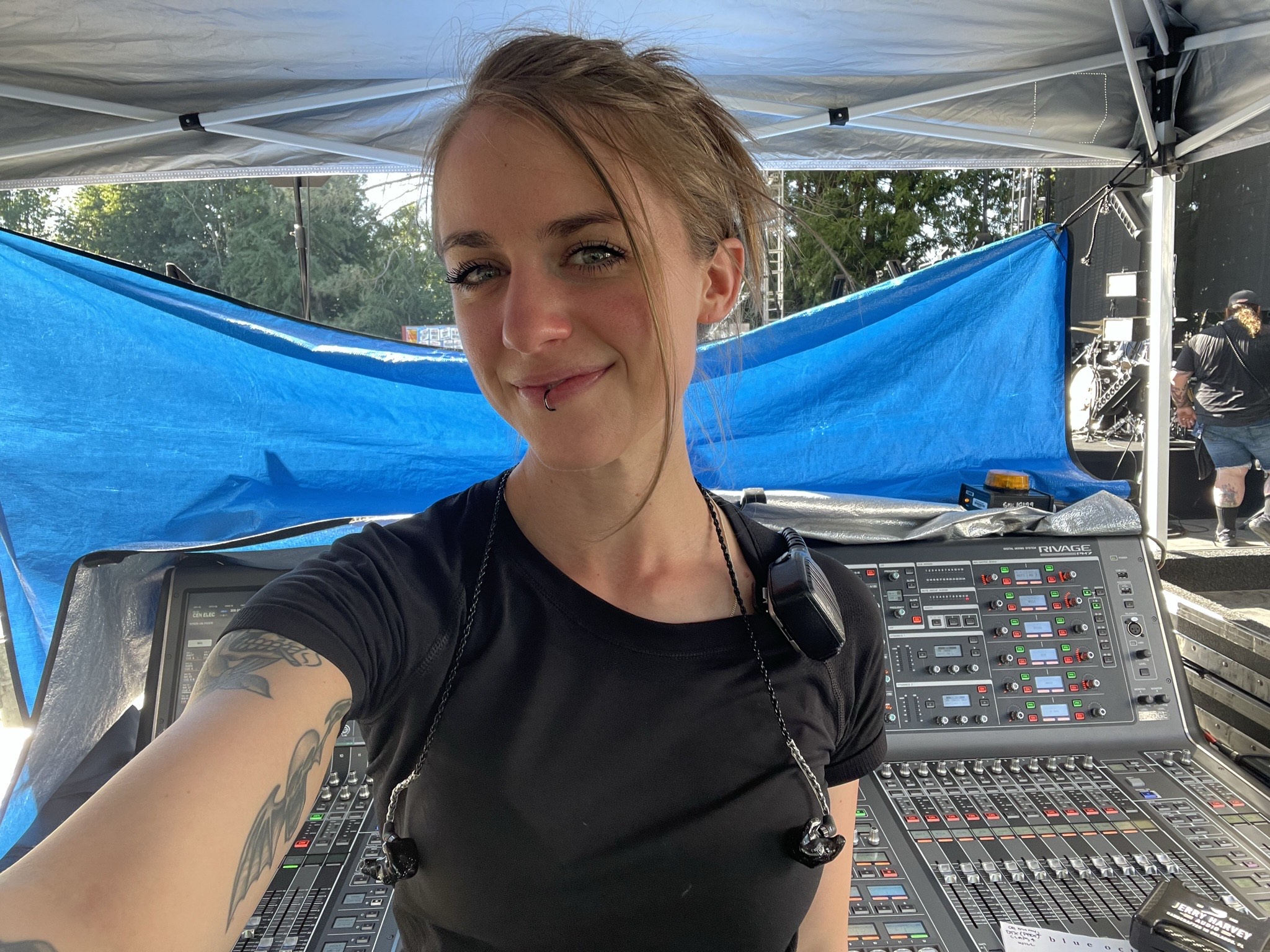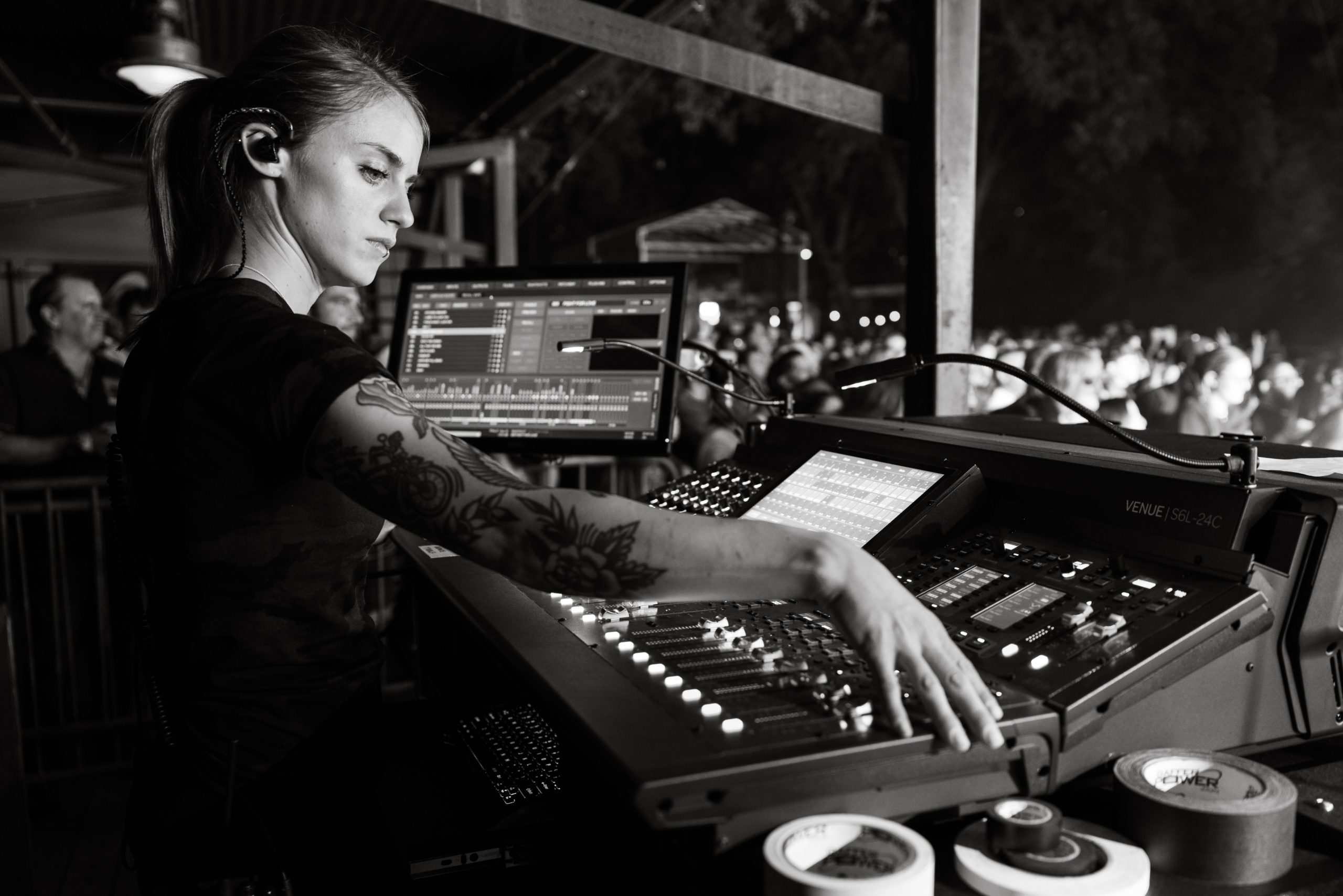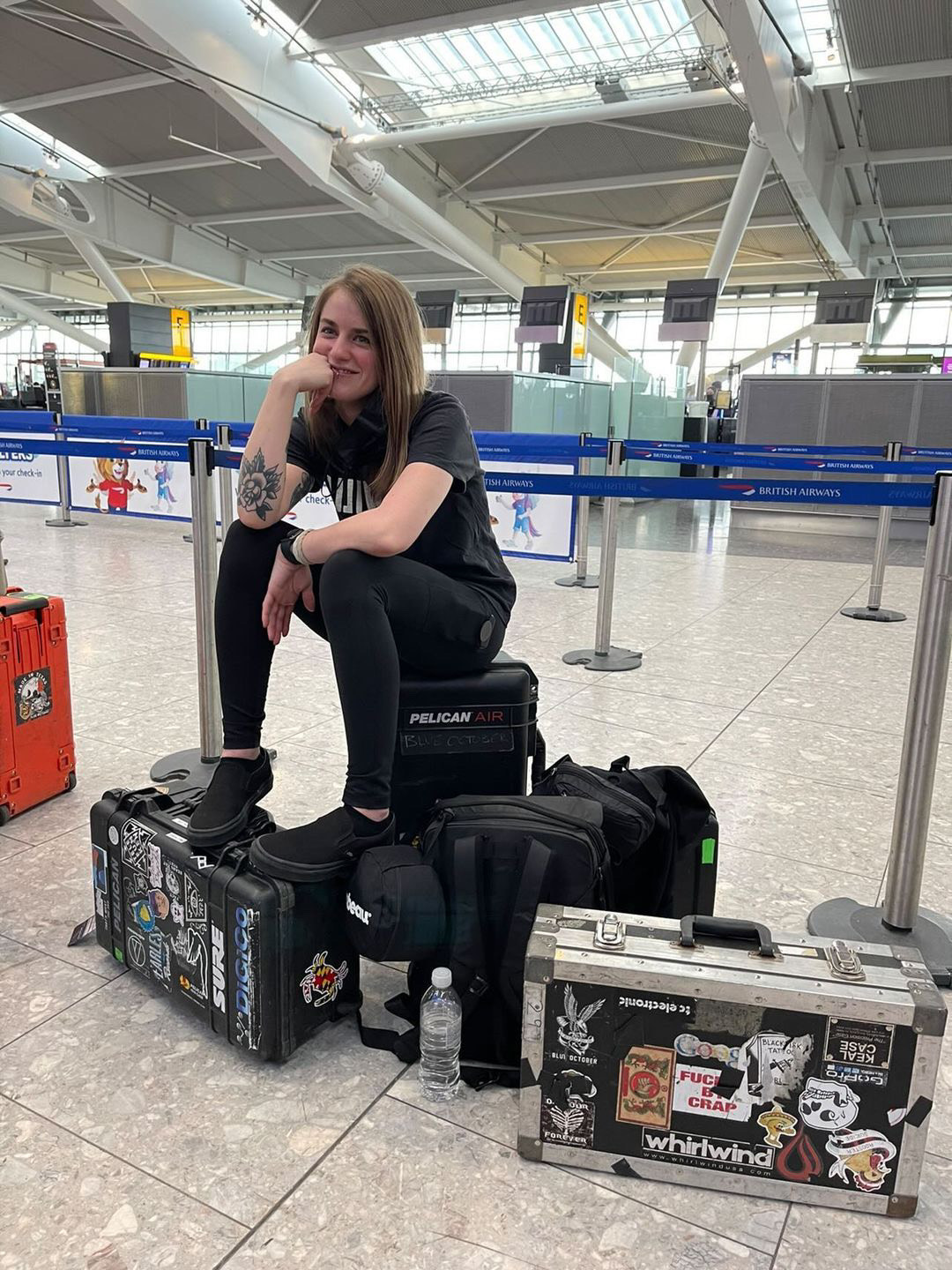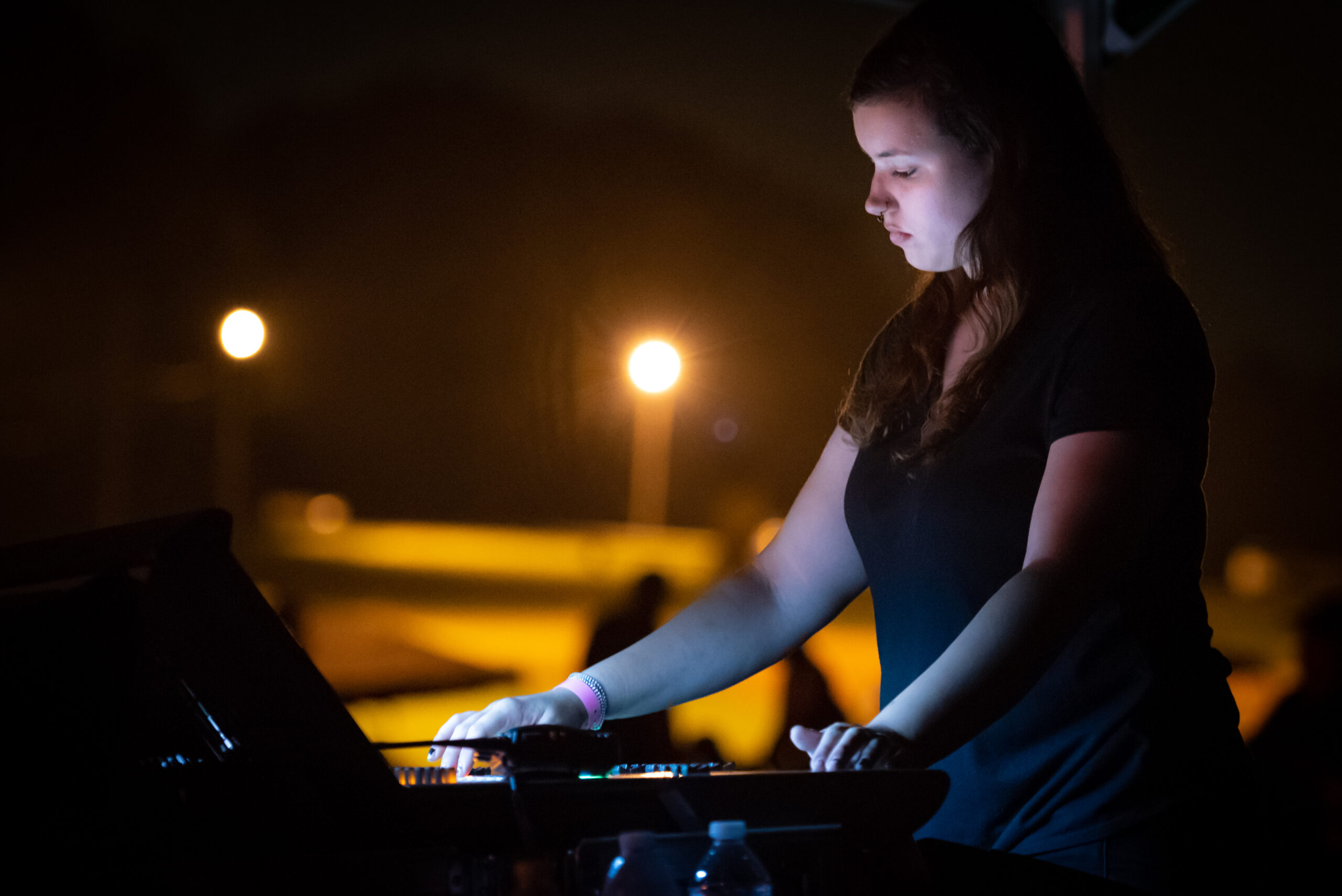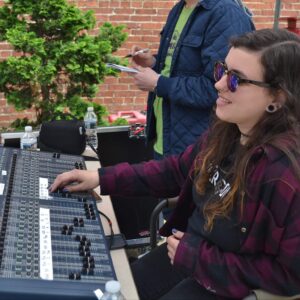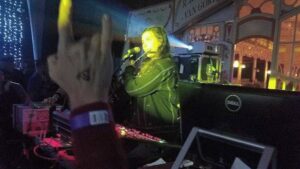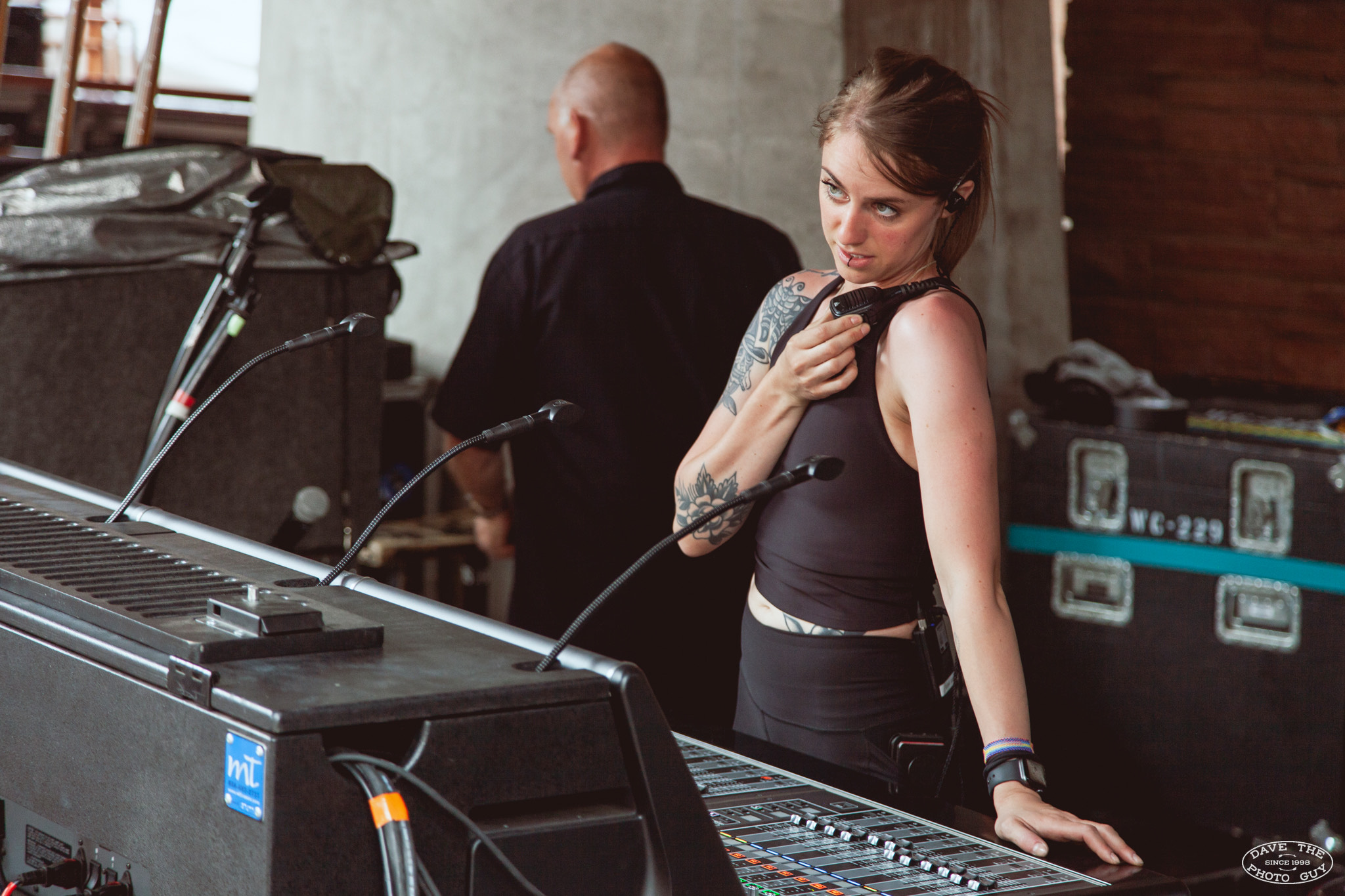
Emily Pearce – From the Marines to Live Sound Engineer
Emily Pearce is the Monitor Engineer and RF Tech for independent artist Blue October. Emily is a longtime musician, learning to play piano at age seven, and would play throughout high school. She also learned to play clarinet and taught herself the oboe in middle school, while playing with percussion ensembles and the drumline during high school and college. Emily learned to play the bass guitar while attending The Los Angeles Recording School.
Emily would enroll at Grand Valley State University in the music education program, yet after two semesters Emily joined the Marines and auditioned for the Marine Corps band. Emily didn’t make the cut which Emily believes was a blessing in disguise after learning about her friend’s poor experience with the Marine Corps Band. Emily would serve a four-year term working in Marine Corps aviation with Marine Aviation Logistics Squadron-13 and VMX-1 both out of Yuma Arizona. She received an honorable discharge as a Sergeant.
After being discharged Emily became interested in the technical side of music production and reached out to a few engineers to get a feel for what that might be like. Emily loved the idea of touring and working live events and used her military benefits to enroll in The Los Angeles Recording School, graduating with an Associate Degree of Science in Recording Arts.
Emily believes the seeds to work in the music industry were planted long before she realized these jobs existed, growing up Emily says she has vivid memories “of Michael Jacksons Thriller, Journey, and Metallica playing in our living room. Alongside artists like Ella Fitzgerald, Dean Martin, Led Zeppelin, and The Beatles. I was always borrowing (with or without permission) my older brother’s mp3 player and my older sister’s CD player so I could jam some MCR, Atreyu, and Death Cab for Cutie. I developed a love for metal and went to my first show at 15 and fell in love.”
Career Start
How did you get your start?
I moved to Los Angeles to attend The Los Angeles Recording School in 2017 to take the opportunity to dip my toes into a major market. Since the program I attended was primarily studio focused, I took a lot of volunteer opportunities around town and was the person that showed up to a gig to just ask questions. I shadowed a few people at White Oak Music and Arts in the valley and The Viper Room on the strip in Hollywood. I attended a SoundGirls class on live sound at the Ventura Theater and was linked up with a summer internship at Schubert Systems. I worked my butt off and showed I could learn and be a part of a team. I was hired full-time and worked there up until the pandemic. During that time I learned so much and was afforded a lot of opportunities to network and grow. None of us were hired as just one specific role which gave me experience in many positions like being a Systems/PA tech, RF tech, stage tech, and mix engineer for notable artists. I also met people who hired me for my current gig, which may be the best part.
I also worked at a few clubs/theaters around town including The Whiskey, The Federal NOHO, and The Satellite in Silver Lake to name a few.
What did you learn interning or on your early gigs?
Understanding your place in a team is just as important as being the leader of it. Being teachable and asking questions when you don’t know something will make people trust you more than if you think you know better than everyone else. And if you are mixing monitors, don’t take it personally.
Career Now:
What is a typical day like?
I am primarily a touring engineer as of right now. We usually start loading in at 11 am and with a lunch break, we are usually ready for line check with techs at about 2:30-3 pm. The guys come to the stage to check a few songs and will sometimes use that time to work on adding new songs to the setlist. Depending on how long they want the stage, we are usually done and have a small break from 4-5 pm before the meet and greet.
During our meet and greet, the band plays one song and while the band takes pictures, the techs get the stage peeled for the opener and cover the set. Dinner break is 6-8 pm. I use this time to hang out and make sure I’m ready for the set by putting fresh batteries in all my wireless, checking my scenes/setlist for correct order, making sure I’ve saved my file, etc. We do another line check right before the set starts at 9 pm. Our show I almost 2 hours so we are usually loaded out and lock the trailer at midnight. Then we shower and get to the bus before call usually around 2-3 am.
How do you stay organized and focused?
I like to make sure everything goes back in the same place and in the same order just as a general rule. This applies to our trailer pack and how gear is packed in the cases and how it’s set up/torn down. Things like mics and labeled looms/cables are all inventoried by me before they go into cases. I always pack up my personal things like laptops, adapters and my in ears first followed by the band’s molds and wireless. Making sure you have a routine helps you not misplace gear especially when load out is moving fast.
I have a photographic memory so I’m pretty good at seeing when something is missing, but having a physical list of gear or order of operations for yourself could be a good way to do the same thing.
What do you enjoy the most about your job?
I love the problem-solving and technical aspects of my job. It’s always fun to figure out a new way to do something or an easier way to get the job done. I love live events because of the finality of a show and how fast things move.
What do you like least?
RF anxiety on a daily basis. Our space is shrinking rapidly.
If you tour what do you like best?
I love traveling and working with amazing people while doing what I love. Sometimes I have to pinch myself to make sure I’m really awake.
What do you like least?
I don’t love paying for an apartment back home when I’m hardly in it.
What is your favorite day off activity?
I love going to get a good meal on days off. Usually something local or what that place may be famous for. Second to that would be hiking and mall walking.
What are your long-term goals?
I would love to work on bigger festivals and shows than what I am doing right now, although I’m pretty content with the level of touring I’m at. I am spoiled and skipped van tours. I just want to always come to the gig excited to work the show and excited to see the people I work with. Right now I’m so blessed that I have both of those things.
My long-term goals are probably more knowledge/skill oriented than working for a huge artist. I just want to be the best I can be at my job.
What obstacles or barriers have you faced?
I am lucky that I haven’t faced too many obstacles along the way. I know that working in a vastly male-dominated world can be daunting to some, but that is something I was used to since I am a former Marine where the numbers are almost identical to live audio. I have been turned down from gigs because a touring camp didn’t want a woman on the bus, but that is their loss and I wouldn’t want to work with people who don’t want me around for something so trivial.
How have you dealt with them?
I find that walking into a gig or venue with the right attitude makes those around you respect you. I tend to show up to the gig with a level of confidence that shows I should be respected, not to be confused with arrogance or false confidence. I’d like to think that’s working for me because I rarely encounter anyone who gives me a hard time. Plus I know I have 11 brothers with me on the bus that always have my back.
Advice you have for other women and young women who wish to enter the field?
Have confidence. In my experience, the industry is changing, especially after the pandemic. A lot of the people who had old ways of thinking have been weeded out. Trust yourself and know that you belong.
Must have skills?
Wrapping cable and a good attitude will take you a very long way. Signal flow and having a good grasp of digital gear are a must as well.
Favorite gear?
I love having a Q box with me. I was generously gifted with one and it’s one of my favorite things to have with me if I need to troubleshoot. I’m also very grateful for Shure’s wireless workbench software. It’s essential for coordinating wireless and I use it daily while on tour.
Anything else you want to add or contribute
Never stop asking questions and learning your craft.
And a huge shout out to Mike G from Schubert Systems for giving me an amazing start, to Josh Sarraulte for teaching me and continuing to teach me everything I know, and to Mckenzee Morley for hooking me up with my current gig.
The people you meet and form friendships with along the way are one of the most important things you do!
